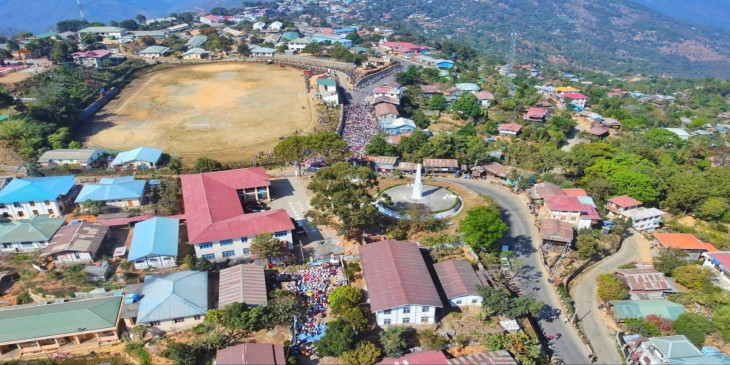
After a year and a half at home, many of Mindat’s children are returning to the classroom. In the 18 months since the children of the township last took up pencils, a lot has changed; from the formerly sleepy border town with a population of 45,000, 20,000 people are said to have deserted, internally displaced following vicious military assaults on the township. Enforced internet blackouts have radically altered people’s daily life and, as with all of Burma’s youth, tens of thousands now question their future.
Chin State’s hope has been replaced with fear. However, from the start of the coup, those living in Burma’s least populous region have refused to give an inch to the military; meeting each twist and turn of the conflict with resistance through innovation.
Despite 200 troops from the Tatmadaw’s 274 Brigade currently being camped in the town, preparing for a new phase of violent conflict which may irrevocably change the lives of its citizens, Mindat’s people are refusing to sacrifice the future of their youngest.
Through its People’s Administrations, Chin State, a trend-setter for Burma’s revolutionaries since February, has established functioning independent proto-bureaucracies within its townships. As with its Chinland Defense Force, its public administrative bodies are an inspiration for revolutionary councils now being established the country over.
Working amongst the destruction of Chin State, the Mindat People’s Administration (Mindat PAF) has performed a minor miracle. Two weeks ago, in the face of heavy artillery barrages and village clearances, revolutionary civil servants, operating in secret and often from hiding, successfully restarted Mindat’s primary school system.
In doing so, Mindat considers that it may be the first township in the entire country to successfully relaunch its educational apparatus; PAFs in Karenni State have begun operating successfully across a number of civil society sectors—notably its police force—but have yet to reopen schools.
“We started teaching in schools across most villages of Mindat township on October 11. The teachers are either doing CDM or have been trained under our teacher training programs— Mindat PAF is providing training for teachers, and our third batch has already graduated,” a spokesperson for the group told DVB.
The group says that 368 volunteer teachers are now actively working for the township’s parallel education system. Administration, training, and the setting of the school’s curriculum is performed by Mindat PAF’s Board of Education, led by professionals with a background in the private education sector.
In just over two weeks, the administration had overseen a return to the classroom of 2,867 primary students.
“We reopened a school in each village with volunteer teachers this month. In most cases, children have convened in former state schools. However, where the military has damaged a school, churches, monasteries, or clinics are hosting classes,” he told DVB.
Before the coup, the NLD administration had closed schools across the country in accordance with COVID-19 rules and regulations. The junta temporarily reopened Burma’s schools on June 1, amid a series of urban bombing, yet quickly closed them again after a devastating third-wave hit Burma in August.
A source responsible for developing Mindat’s education sector told DVB that the NUG had been active in supporting home-based learning across Burma. However, in Mindat—geographically remote and isolated by perpetual military mandated internet cut-offs—a different approach was needed.
“We developed our own community-based education system, based on providing teacher training for every village in the township,” he said.
Classes in Burmese, English, and mathematics are being delivered, based on the curriculum outlined by the NUG.
“Due to the interim nature of the schools, opening hours depend on local situations. Some schools offer full-day classes, others half-days.”
The administrator said that Kanpetlet, a neighboring township, has asked Mindat for help in rolling-out its own education system in the near future.
To reopen a functioning and highly comprehensive primary system in a situation where civil servants are actively being hunted, and where children are fleeing war to IDP camps, is a testament to the remarkable determination of Chin’s people to carry on living a complete rejection of military control.
In doing so, the interim administration is aiming for a complete return to a functioning civil society, but modestly notes some shortcomings. The number of students returning to primary schools is lower than before, they say, but that is largely because a huge number of children have fled the township in the face of violent clashes.
Also, for the moment, academic teaching is taking a back seat to Mindat PAF’s conscious focus on growing social interactions amongst groups of young learners, long deprived of socialisation and faced with an environment traumatising for even the toughest.
For now, Mindat’s “people’s teachers” are going to work with the aim of making children happy at school.
“So far, we’ve only reopened primary schools because our capacity and skills are still limited for higher education.” the spokesperson said.
In an October 18 speech, Min Aung Hlaing told the public that the junta are working to reopen schools as soon as COVID-19 positivity rates drop to 3 percent, a target he said is achievable by the end of October. Following the importation of a reported 23 million Sinopharm vaccines, the junta has specifically fast tracked student vaccinations.
Many doubt that this fact alone will be enough to convince students to return to class.
The Mindat PAF spokesperson said, “Currently, we are applying our own COVID-19 prevention rules. Transmissions of the virus have decreased significantly in Mindat. For the past five months, we have been isolating ourselves in refugee camps.”
Mindat township consists of 70 villages, hosting a total of ten state owned high schools. Of an estimated total of 13,000, 7,000 of Chin’s teachers are registered as participating in CDM. In May, only 1,796 students enrolled across the whole of Chin State after the junta reopened schools.
It has been proven, Mindat PAF says, that if the military reopened schools, all of the township’s students and teachers would refuse to attend.


